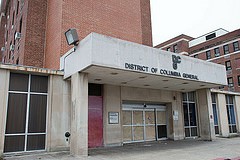Some families become homeless simply because they earn too little, while others lose their homes after a short-term setback such as a serious illness. But a small subset of homeless families — like Relisha Rudd’s ‘ face deep and long-term challenges such as addiction, mental illness, or chronic physical health problems. Without intensive help, these families often cycle in and out homelessness, and their children may end up in foster care.
DCFPI will highlight three strategies

to help vulnerable homeless families when we testify before the DC Council today on the report on the abduction of Relisha Rudd.
- Move families out of shelter: Stable housing with wraparound case management is a proven way to help families overcome personal challenges.
- Hire more social workers for DC General: This will help identify early the families who need most help.
- Coordinate care: Many families are served by multiple assistance programs that are not always well coordinated.
The District has struggled to move vulnerable families out of shelter, even though there is a program to do just that ‘ permanent supportive housing (PSH). Research finds, not surprisingly, that parent and child well-being decline while a family is in shelter. This year’s budget included funding for PSH, but it took the District nearly eight months to move any families out of shelter into it. The budget for next year once again includes funding for PSH. The District government needs to address any administrative problems with PSH so that eligible families can take advantage of this program when needed, rather than languishing in shelter.
A second important goal is to quickly fill newly budgeted staff positions at the DC General Shelter. These staff, added to the fiscal year 2015 budget, will provide case management to children living at DC General. The best approach would be to fill these positions with licensed social workers, who have more experience and education than the typical case manager.
Finally, there is no process for how to coordinate the services a family is already receiving when they enter shelter. The report on Relisha Rudd wisely recommends creating a cross-agency working group to ensure that the staff from all programs helping a given family can work together. For the coming winter, a temporary procedure is needed to ensure that families currently in the shelter don’t fall through the cracks.
By taking these steps, the District can ensure that the most vulnerable families receive the services they need to exit homelessness and tackle their other challenges.
To read the entire testimony, click here.
To print a copy of today’s blog, click here.
